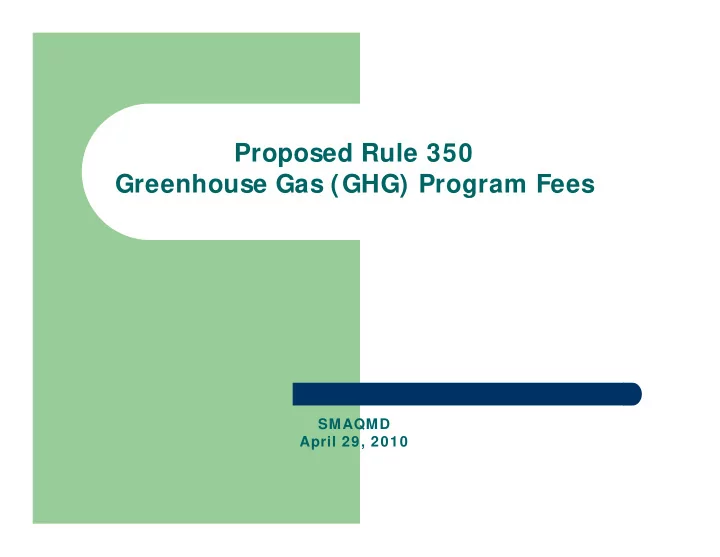

Proposed Rule 350 Greenhouse Gas (GHG) Program Fees SMAQMD April 29, 2010
Overview Board adopted Rule 250, Sacramento Carbon Exchange Program (SCEP), on March 25, 2010 Established a mechanism to bank voluntary GHG emission reductions and – to sell, use, or retire certified carbon credits No requirements for using credits (e.g. restrictions, discounting) – Governed by other laws or regulations (e.g. CEQA) Board held the first public hearing for proposed Rule 350, Greenhouse Gas Program Fees, on March 25, 2010 Establishes fees to recover the District’s cost to implement proposed Rule – 250 Costs include staff time plus actual cost of other items (public notices, – contractors, etc.) Today’s Meeting Staff will address Board’s comments from the March meeting – Second public hearing and consider adoption of proposed Rule 350 –
March Board Meeting Board member’s questions/comments: – Have you analyzed any current projects that may use the bank, such as Easton? – It would be interesting for Staff to run an example case – Make the GHG Bank known to municipalities and jurisdictions
Project Plan Fees (Rule 350) Initial fee submitted with Project Plan $960 – Actual cost of publishing preliminary and final public notices in the newspaper (currently $200 -$250) Potential additional fees If evaluation exceeds 5 hours, additional fees to recover costs – ($192 per hour) Actual cost of contractor – Actual cost to prepare CEQA documents –
Credit Verification Fees (Rule 350) Fee submitted annually with emissions data – Verified by the District, the initial fee is $1920 – Verified by a third-party verifier, the initial fee is $960 Potential additional fees – If work exceeds the 5-10 hours, additional fees to recover costs ($192/hour) – Actual cost of third-party verifier or other contractor Estimated third-party verifier costs is $1475 - $2500
Easton Project General Plan Amendment for 8,500 acres with variety of uses – 4,883 dwelling units – 4 million sq feet office and commercial uses Approved December 2008 GHG Reduction Plan – On-site mitigation to reduce GHG emissions by 57% compared to “business as usual” emissions – 138,000 metric tons CO2/year after mitigation
Example Project Fee Comparison Staff used a local dairy project that is being registered in Climate Action Reserve as the example project to illustrate the fees Compared fees to Chicago Climate Exchange (CCX), Climate Action Reserve (CAR) Major fee differences between programs Program Structure: – SMAQMD and CAR are GHG banking programs only CCX is more than a banking program; it is a cap-and-trade program Membership Fees: – SMAQMD – no membership fees CCX and CAR – membership required and annual renewal of membership fees CCX and CAR only allow credit transfer among members Transaction fees: – SMAQMD – flat fee ($192) CCX and CAR – based on number of metric tons of CO 2 E
Example Project – Credit Generator Administrative Fee Comparison Dairy Digester Project – 2116 metric tons of CO 2 E credits per year Carbon Market Chicago Climate Climate Action SMAQMD Exchange Reserve Fees to Credit $5.64-$6.15 $1.65-$2.13 $1.54-$2.78 Generator/Seller per metric ton per metric ton per metric ton Fees to Buyer $4.79 -$4.82 $0.48 $0.09 per metric ton per metric ton per metric ton Price of Credits – (April 2010) CCX: $0.12 per metric ton of CO 2 E – CAR: $4.70 per metric ton of CO 2 E – Rule 250: Unknown –
Example: Easton Project – Credit Buyer Easton Project – mitigate 138,000 metric tons of CO 2 E per year Carbon Market Chicago Climate Climate Action SMAQMD Exchange Reserve Fees to Buyer 1 $19,660 - $23,800 2 $1,000 $1,344 Cost of Credits $16,560 $648,600 $16,560 - $648,600 3 $36,220 - $40,360 $649,600 $17,904 - $649,944 Total 1 Assumes 1 credit transaction for CCX and CAR, and 7 transactions for SMAQMD 2 Range depends on type of trade 3 Range uses CCX credit price (low end) and CAR (high end) in April 2010
Outreach - Briefing Jurisdictions As part of ongoing monthly/quarterly communication meetings – Sacramento County, Folsom, and Galt completed Will return to brief the jurisdictions if credits are banked or if additional protocols are developed – Remaining jurisdictions will be briefed as the ongoing meetings occur
Staff Recommendations – Conduct a public hearing on proposed Rule 350 – Determine that the proposed rule is exempt from CEQA – Adopt the resolution approving the proposed rule
Recommend
More recommend